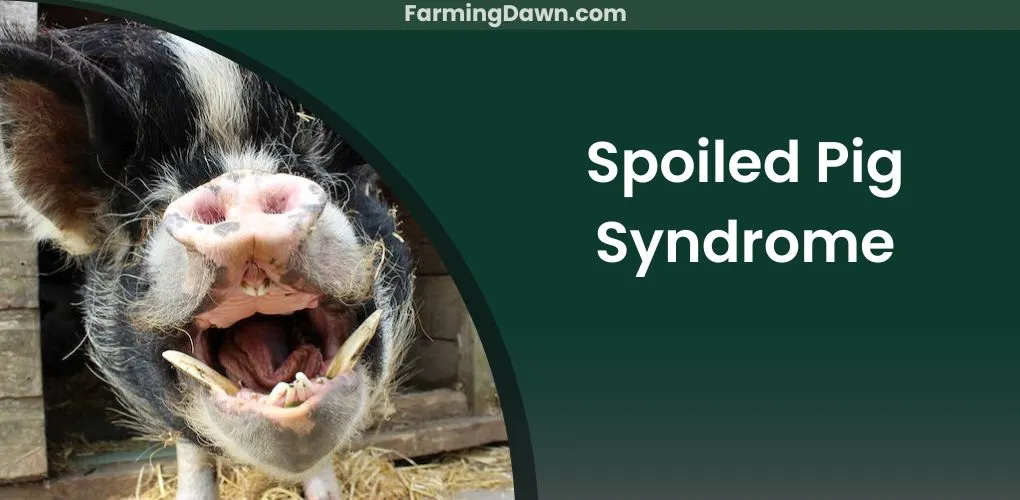Spoiled Pig Syndrome is a very real problem that many farmers have experienced, and it can significantly impact the quality of life of their pigs. As Joel Salatin, renowned farmer, and author, says: “I’ve seen far too many cases where people are not taking proper care of their animals due to this condition.”
In this article, I’ll discuss what Spoiled Pig Syndrome is, how to identify it in your herd, and provide some tips on how to prevent it from occurring.
What Is Spoiled Pig Syndrome?
Spoiled pig syndrome is a term used to describe the idea that pigs are kept in unhealthy, overcrowded, and unsanitary conditions. This results in pigs becoming more aggressive than normal, leading to dangerous situations for humans and other animals.
These problems can be avoided if farmers take the time to properly care for their pigs and provide adequate space, nutrition, cleanliness, exercise opportunities, and mental stimulation. Pigs should also have access to natural sunlight so they can stay healthy.
When these factors are considered, it will result in healthier livestock that will produce better quality meat and eggs while reducing stress-related illnesses such as spoiled pig syndrome.
Recognizing The Symptoms Of Spoiled Pig Syndrome
The symptoms of spoiled pig syndrome can be hard to identify, but they are often quite noticeable when you know what to look for.
Examine The Pigs Behavior
The first step in recognizing the signs is to closely examine your pigs’ behavior. Do they seem listless or depressed? Are they eating and drinking less than normal? Have their sleeping habits changed? Any changes in their routines could point to something wrong with them.
Physical Indicators
Paying attention to physical signs that may indicate an issue is also important. Look closely at their coats; do they appear dull and lifeless compared to other animals? Is there any discoloration or unusual patches on their skin?
Respiratory Issues
Check around their nostrils, too; if there is excessive discharge, this could mean respiratory issues. Lastly, ensure that you monitor your pigs’ overall health by taking note of any changes in energy levels or movements throughout the day.
Potential Causes Of Spoiled Pig Syndrome
Spoiled pig syndrome is complex, and the potential causes can be multi-faceted. I believe that genetic predispositions coupled with a stressful environment are major contributing factors to this condition.
Pigs who have been bred for production purposes may possess a tendency towards aggression or other negative behavior traits which manifest when exposed to certain conditions. Also, if pigs are raised in overcrowding or undernourishment situations, they become more prone to stress and anxiety.
In addition, improper nutrition can weaken immune systems and make them vulnerable to infection. A lack of proper exercise and exposure to sunlight could also contribute significantly to the development of spoiled pig syndrome by decreasing their overall health and well-being. Other symptoms could include your pig not eating, appearing lazy, and vomiting.
All these aspects, taken together, create an unfavorable circumstance where ill-mannered behaviors often prevail in our herds.
How To Treat Spoiled Pig Syndrome?
Treating spoiled pig syndrome is not a one-size-fits-all approach. Because different factors can cause this condition, it requires an individualized treatment plan that considers each animal’s unique needs. However, there are some common treatments for this condition that have proven to be effective.
Provide Nutritional Diet And Exercise
First and foremost, to treat spoiled pig syndrome effectively, it’s important to ensure that pigs have proper nutrition and adequate exercise. This means providing them access to new food sources such as hay, straw, and grass clippings and plenty of room to roam around and explore their environment.
Also, pigs should receive ample amounts of water and minerals daily to prevent mineral deficiencies that can contribute to symptoms associated with spoiled pig syndrome.
Psychological Treatment And Medication
In addition to diet and exercise modifications, veterinarians may also prescribe medications to reduce inflammation or pain associated with spoiled pig syndrome. These drugs typically come as NSAIDs (nonsteroidal anti-inflammatory drugs) which help reduce swelling and discomfort from affected joints or other body areas.
In more severe cases where antibiotics are necessary, NSAIDs too may be recommended by your veterinarian. Finally, psychological support may also be beneficial for animals suffering from spoiled pig syndrome to help them feel more comfortable within their environment and less stressed overall.
Environmental Factors To Consider
The key environmental factors to watch out for are temperature, humidity, airflow, ventilation, and light. Temperature extremes can put stress on pigs’ bodies and cause sickness. Too much heat or cold can also create uncomfortable living conditions for your piggy friends. High humidity levels make it harder for pigs to cool down their body temperatures when they get too hot, leading to serious issues like dehydration or organ damage.
On the other hand, low humidity levels increase dust, leading to respiratory problems in young piggies. Airflow should be monitored closely since stale air with high CO2 concentrations decreases oxygen levels – something no swine wants!
Providing mud to the pigs can help alleviate their stress level. Pigs like mud because it is a source of pleasure and fun for them, plus it also saves them from parasites, and predators.
Ventilation systems should be designed properly so you have enough fresh air coming in and ensure drafts don’t blow directly at resting areas where your piglets will chillaxing. Lastly, consistent natural lighting helps regulate hormones and keep circadian rhythms balanced; however, try not to expose the sensitive eyes of newborns to bright lights until after two weeks of age because lack of sleep doesn’t help anyone stay healthy!
Alternative Therapies For Treating Spoiled Pig Syndrome
Pig owners that wish to avoid the onset of Spoiled Pig Syndrome may find themselves exploring alternative therapies for treating this condition. Acupuncture and botanical remedies offer natural relief without antibiotics or other drugs.
Acupuncture Therapy For Spoiled Pig Syndrome
Acupuncture has long been a popular treatment option in traditional Chinese medicine for combating ailments of all kinds. It is believed that stimulating specific points on the body helps to improve overall energy flow, allowing qi (or “chi”) to move freely throughout the body once again. This can help reduce inflammation and pain associated with Spoiled Pig Syndrome.
Botanical Remedy For Spoiled Pig Syndrome
Botanical remedies also have their place in holistic healing; these are typically herbal or dietary supplements that contain certain compounds that might be beneficial when used as adjunct therapy alongside more conventional treatments such as antibiotics or anti-inflammatory medications.
Long-Term Effects Of Spoiled Pig Syndrome
When it comes to spoiled pig syndrome, the long-term effects can be devastating. This type of condition often has a huge impact on not only the physical health of the animal but its mental and emotional state.
If left untreated, porkers with spoiled pig syndrome may develop serious behavior problems such as:
- Aggression
- Fear
- Depression
They are also prone to overeating, leading to obesity, metabolic syndromes, and other chronic illnesses like diabetes. They become more susceptible to infections due to an immune system weakened by poor nutrition and lack of exercise.
Pigs suffering from SPS tend to have shorter lifespans when compared to healthy pigs.
Vaccination As A Prevention Method
Now that we’ve discussed the long-term effects of Spoiled Pig Syndrome let’s talk about prevention. Vaccination is a great preventative measure for this condition and should be used whenever possible. We can vaccinate pigs to protect them from infection and help reduce the likelihood of developing Spoiled Pig Syndrome.
Vaccines are made up of weakened or killed forms of bacteria that cause the disease to stimulate an immune response in your pig. This helps the body recognize and fight off these bacteria if they contact it later. It’s important to note that vaccination isn’t always 100% effective, but it does greatly reduce the chances of getting infected with Spoiled Pig Syndrome. Vaccinating our animals regularly can drastically decrease their risk of contracting this devastating condition.
Spoiled Pig Syndrome-Conclusion
It’s time to take Spoiled Pig Syndrome seriously. Not only does this disease affect the health of our pigs, but it can also have a huge economic impact. It’s estimated that over $21 million is spent annually on treatments for infected animals in the United States alone. With the above-mentioned simple strategies, we can ensure that our pork-producing friends remain healthy and free from this debilitating illness. If you have any other questions related to SPS, ask me in the comments. Thank you!






